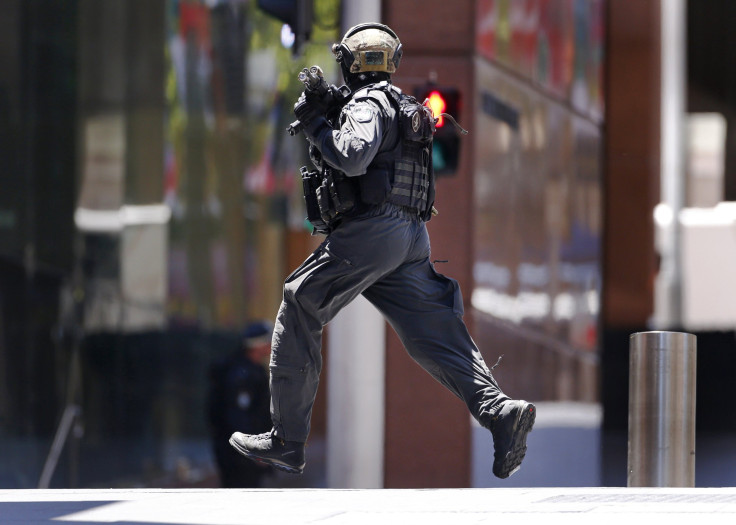Sydney Siege: Flag In Australian Terrorist Attack Is Not ISIS, But Similar To A Hizb al-Tahrir Flag

A number of terrorist groups active in Australia could be responsible for the hostage-taking that began Sunday in siege, with affiliations that range from Hezbollah to Hamas, but the Islamic State group has not officially aligned with any of them. At least one of those groups uses the flag that was displayed in the window in the Martin Place coffee shop where a man saying he has a bomb is holding several hostages, but it isn’t ISIS.
A gunman overran the Lindt Café in Sydney Sunday night and reportedly forced hostages to display a black flag with what appeared to be the shahada, the Muslim creed, in white. Though many were quick to tie the flag to the terrorist group known as the Islamic State or ISIS that has made unprecedented gains across Iraq and Syria and recruited thousands of foreign fighters, the flags are not the same. However, ISIS has put out a global call for its supporters to conduct lone-wolf attacks and that possibility has not been ruled out in Sydney.
“There is a spectrum of ISIS’ global influence,” Harleen Gambhir, a counterterrorism analyst at the Institute for the Study of War recently told International Business Times, citing the difference between lone-wolf attacks and, “ISIS people going to recruit and establish cells. There’s a different texture of ISIS actually reaching out and ISIS just benefitting. They don’t want the responsibility to deal with all those groups.”
At least one designated Australian terrorist group uses the flag displayed in the Lindt Café window. Hizb al-Tahrir has roots in Lebanon and Jerusalem and is active in around 40 countries. Earlier this year the group held a rally in Lidcombe with some 600 people in attendance, and declared that the Australian government was waging "a war on Islam -- a war that is being waged in this country as it is in the rest of the world,” wrote Australia’s Daily Telegraph. The group's name is Arabic for "the party of liberation."
The group got involved in the Syrian revolution in its early stages and is committed to removing Syrian President Bashar Assad, but it has not pledged allegiance to ISIS. However, it does share many of the same goals, including establishing a caliph-led Islamic state. The group put out a statement in October denouncing the ISIS caliphate.
“ISIS is merely an armed group controlling some areas in Iraq through violence without any support from the people of those areas, and the Ummah [Muslim community] does not recognize its alleged caliphate,” according to the statement.
Australia’s radical Islam problem does not end with Hizb al-Tahirir and the country is vulnerable to an ISIS-linked lone-wolf attack. Since ISIS declared its caliphate in June, around 150 foreign fighters from Australia have travelled to Iraq and Syria and fought with groups like ISIS.
In September, Australia security officials arrested a 22-year-old man accused of planning a “horrific” terrorist attack on Australian soil. The arrest was part of what Australian officials called the biggest counterterrorism raid the country had ever seen.
“This is one of the most disturbing developments in our domestic security in quite some time,” Australian Foreign Affairs Minister Julie Bishop told the Australian Broadcasting Service in June. “There’s a real danger that these extremists also come back home as trained terrorists and pose a threat to our security.”
© Copyright IBTimes 2024. All rights reserved.






















